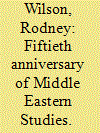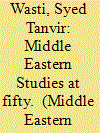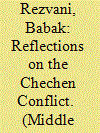|
|
|
Sort Order |
|
|
|
Items / Page
|
|
|
|
|
|
|
| Srl | Item |
| 1 |
ID:
134504


|
|
|
|
|
| Summary/Abstract |
The article discusses the life, travels, writings and politics of Arminius Vambéry (1832–1913), a noted Hungarian Turcologist. Vambéry's expertise was in the field of Turcology and he invested several years in Istanbul to study it. Afterwards he travelled for close to two years in Central Asia at great personal risk. Hence he disguised himself as a dervish and collected there manuscripts in the Turkic languages. He used these for his research after his return to Budapest, being appointed as a university professor there. Vambéry published numerous books and articles in several languages describing his life and travel experiences as well as many studies in Turkic linguistics and related fields of research. In his later years he published many newspaper articles on patriotic politics which were intended to promote Hungary's interests. Some of his scholarly works, chiefly on the languages and history of Central Asia, are still referred to today by scholars and students in those areas of research.
|
|
|
|
|
|
|
|
|
|
|
|
|
|
|
|
| 2 |
ID:
134512


|
|
|
|
|
| Summary/Abstract |
Middle Eastern Studies Vol.50, No.6; Nov.2014: p.1006-1026
|
|
|
|
|
|
|
|
|
|
|
|
|
|
|
|
| 3 |
ID:
134508


|
|
|
|
|
| Summary/Abstract |
The Euro-Arab Dialogue (EAD) was established by the European Economic Community in 1974 as a way of improving bilateral relations between Europe and the Arab world in the wake of the October 1973 Arab-Israeli War and the subsequent global energy crisis. This article examines the success of the EAD in its first three years in existence (between 1974 and 1977). It begins with an analysis of the literature on the framework in these years. Much of this material argues that the EAD was a success in achieving its goal of improving relations with the Arab world as well as evidence of the success of the recently established European Political Cooperation (EPC) framework in general. This article challenges this view and instead argues that the EAD, even in its early years, was not a success due to three factors: the first was the failure of the EEC to keep the EAD focused on economic issues and to prevent the politicization of the framework; the second was the Community's inability to come to grips with the deep internal divisions over both the mandate and goals of the EAD; and the third was American hostility towards the EAD from the time of its birth.
|
|
|
|
|
|
|
|
|
|
|
|
|
|
|
|
| 4 |
ID:
134503


|
|
|
|
|
| Summary/Abstract |
In his editorial note to the first issue of Middle Eastern Studies, Elie Kedourie envisaged the new journal promoting ‘scholarly discussion of the political, economic, religious and legal history of this area since the end of the eighteenth century, its literature, social geography, sociology and anthropology’. He believed there was a sufficient abundance of material to make it into a reasonably distinct and homogenous field of academic study.
|
|
|
|
|
|
|
|
|
|
|
|
|
|
|
|
| 5 |
ID:
134510


|
|
|
|
|
| Summary/Abstract |
This article examines a largely overlooked topic in scholarship on Ottoman history and discusses the cases of the murder of infants in Ottoman towns and cities. Based on archival findings, the article asks questions such as: what were the motivations behind child murder, who carried out this act, who were the victims, what were the methods used, and how extensive was it in the Ottoman society? The nature of this crime also forces us to problematize the available documentation and hence the article also discusses the nature of the sources that offer us a glimpse of the infanticide cases. It demonstrates how social status and gendered hierarchies in Ottoman society intermingle in infanticide cases and the choice to murder babies as a means of birth control. In sum, this article discusses the links between child murder and poverty, illegitimacy, and, most important of all, the experience of being a lonely, single, and poor woman in Ottoman society.
|
|
|
|
|
|
|
|
|
|
|
|
|
|
|
|
| 6 |
ID:
134509


|
|
|
|
|
| Summary/Abstract |
The article looks at statements and acts of the core members of the Committee of Union and Progress in the run-up to the constitutional revolution of 1908 to determine whether these express ideas that later guided them in their policies in Anatolia. The main argument is that the Balkan War of 1912–13, in which the European provinces were largely lost, was an important catalyst that led to a radicalization of policies but that in fact the basic outlook of the Young Turks had been shaped years earlier, during their struggle to keep Macedonia Ottoman. Their relative ignorance of Anatolia led them to read the social and political realities there through a Macedonian prism.
|
|
|
|
|
|
|
|
|
|
|
|
|
|
|
|
| 7 |
ID:
134507


|
|
|
|
|
| Summary/Abstract |
At the beginning of the twentieth century attempts were made by the Zionist Organization and the Jewish Territorial Organization (JTO) to promote Jewish settlement in the region between the two rivers, the Euphrates and the Tigris. The settlement plans never reached the practical stage, and the plan disappeared without a trace. One hundred thousand Jews from Russia were not sent as planned in the train from Odessa to Iraq, and Jewish settlements were not established in it. Nevertheless, although the settlement plan was never carried out, it had great import not on the practical level but on the ideological one. The article is divided into three parts. The first part is an attempt to gain an in-depth understanding of Territorialist ideology and of Zionist thinking; the second part traces the efforts of the Zionist Movement and of the JTO to promote a comprehensive settlement plan in Mesopotamia; the third and last part examines the arguments and explanations of the Territorialists against Palestine and for Mesopotamia and other territories in East and Southwest Africa, Canada and Australia.
|
|
|
|
|
|
|
|
|
|
|
|
|
|
|
|
| 8 |
ID:
134501


|
|
|
|
|
| Summary/Abstract |
The late Elie Kedourie and his wife Sylvia G. Haim (Kedourie) have had a profound dual impact on Middle Eastern studies: as authors and editors of the most significant books and essays in the field and as founders and editors of the premier journal in the field, Middle Eastern Studies. To have kept a journal going for 50 years is an achievement in its own right, but the Kedouries did better than that; they have kept a high standard, a loyal group of writers and a loyal group of readers and subscribers. The journal has been the venue of choice for seasoned academics as well as for young scholars taking their first steps in academic writing on the Middle East. Many of the essays published in the journal are still being read and cited and the book review section has done what it should do: it made and broke reputations and set standards. As a reader and contributor I salute and congratulate Sylvia and wish her and us many more years of great editorial work.
|
|
|
|
|
|
|
|
|
|
|
|
|
|
|
|
| 9 |
ID:
134502


|
|
|
|
|
| Summary/Abstract |
If a monument to the success of Middle Eastern Studies as a pre-eminent journal in its chosen area were to be required, a simple glance at the list of published articles and the names of their authors over the last five decades would be sufficient to impress even the most fastidious observer. This is the journal par excellence for those who wish to understand both the past and the present of the region known as the Middle East as well as its relations with the rest of the world. The range and scope of the articles in Middle Eastern Studies is wide enough to be almost baffling to the casual reader, and it is no exaggeration to say that in the endnotes to many articles there is more substantive material to be found than is often encountered in full-length pieces published in less demanding publications. The yardstick set by the founding editor of Middle Eastern Studies, the late Professor Elie Kedourie, was that for an article to be accepted, it had to be original, scholarly, relevant and readable. Elie Kedourie's own books and articles overflowed with sound knowledge, were broad in outlook and balanced in judgement; they were compassionate even in criticism, and exuded an immaculate style and rare wit that made them literally unputdownable. Hence, all was not grist that came to Elie Kedourie's mill when it came to the publication of articles in the journal which he first made famous and which, under the continuing illustrious editorship of Sylvia Kedourie, has gone on from strength to strength. The achievement-studded past or the glamorous present address of a prospective author meant little unless the merit of the article measured up in both thought and expression to the accumulated standards of the journal. This is why acceptance of one's manuscript for publication in Middle Eastern Studies was, and continues to remain, a source of unique satisfaction to authors – it is the hallmark that certifies that their article is one of quality.
|
|
|
|
|
|
|
|
|
|
|
|
|
|
|
|
| 10 |
ID:
134505


|
|
|
|
|
| Summary/Abstract |
The Chechen Conflict is the most fatal and protracted conflict in the post-Soviet space. While it is the most discussed conflict there, it is also the least understood. Many contradicting accounts of it exist, and still many questions remain unanswered. One reason is that the nature of this conflict has changed over time. Unlike what many - particularly Western - analysts think, it is not a religious conflict. It began as an ethno-nationalist separatist conflict but only later was it infiltrated by extremist Salafis/Wahhabis. At this moment a war is going on between the local Chechen and the central Russian governments against the Salafi/Wahhabi Emirate of the Caucasus. Chechnya is the only autonomous region in Russia in which a separatist movement had been successful. The possible reasons are the peculiarities of the Caucasus; especially its mosaic type of ethnogeographic configuration and the traumatic past of many of its peoples. Another important factor in the explanation of such a separatist conflict in Chechnya - and nowhere else in the North Caucasus - is the fact that only in Chechnya has a titular minority enjoyed a dominant demographic position. This paper also discusses issues such as the nature of Islam in Chechnya and the Russian geopolitical codes.
|
|
|
|
|
|
|
|
|
|
|
|
|
|
|
|
| 11 |
ID:
134511


|
|
|
|
|
| Summary/Abstract |
Since its independence in 1956 until September-October 2013, at the completion of this study, Sudan has had seven civilian or military regimes. All of them, excluding the military regime headed by General Abd al-Rahman Muhammad Hasan Siwar al-Dahab (1985–86) and the current Bashir regime, were overthrown. These regimes focused only on remaining in power and did little to relieve Sudan's desperate hardships. This study, which surveys the decade (1989–99) under the two-headed leadership of Bashir and Turabi, will explore the truth of this claim. The Bashir-Turabi regime marked a unique and important chapter in Sudan's political history and had crucial ramifications for Sudan's politics in the twenty-first century.
|
|
|
|
|
|
|
|
|
|
|
|
|
|
|
|
| 12 |
ID:
134506


|
|
|
|
|
| Summary/Abstract |
Rhetoric espoused by the Baʿthi regime of Iraq reflected a deliberate mix of nationalistic and religious elements, most clearly expressed in the discourse surrounding the war with Iran, termed ‘Saddam's Qadisiyyah’, after a battle during the Arab-Islamic conquests, which Saddam Husayn turned into a metaphor for Arab-Iranian relations. As the memory of the seventh century engagement was popularized in Iraq, Qadisiyyah nomenclature spread throughout the Arab world (and beyond) and Saddam's political paradigm found acceptance among Arab governments and western observers alike. Saddam used this propaganda campaign to three ends: (1) to portray the political conflict with Iran as an ancient ethnic clash; (2) to promote his cult of personality; and (3) to present a successful precedent for Arab victory over Iran. In doing so, Saddam forged a new ‘Arab-Islamist’ discourse, combining religious faith with nationalist sentiment, which he embraced with increasing reliance to the end of his rule. Today, radical Sunni Islamist groups have assumed the mantle of this rhetoric.
|
|
|
|
|
|
|
|
|
|
|
|
|
|
|
|
|
|
|
|
|